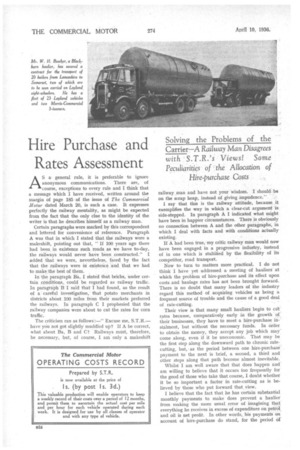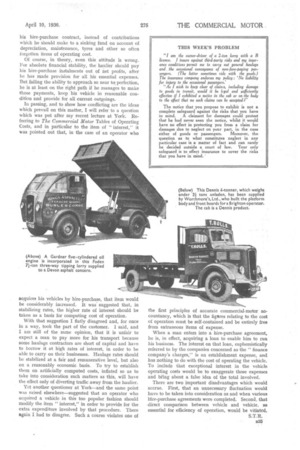Hire Purchase and Rates Assessment
Page 38

Page 39

If you've noticed an error in this article please click here to report it so we can fix it.
AS a general rule, it is preferable to ignore anonymous communications. There are, of course, exceptions to every rule and I think that a message which I have received, written around the margin of page 185 of the issue of The Commercial Motor dated March 20, is such a case. It expresses perfectly the railway mentality, as might be expected from the fact that the only clue to the identity of the writer is that he describes himself as a railway man.
Certain paragraphs were marked by this correspondent and lettered for convenience of reference. Paragraph A was that in which I stated that the railways were a makeshift, pointing out that, " If 100 years ago there had been in existence such roads as we have to-day, the railways would never have been constructed." I added that we were, nevertheless, faced by the fact that the railways were ha existence and that we had to make the best of them.
In the paragraph Ba, I stated that bricks, under certain conditions, could be regarded as railway traffic. In paragraph B I said that I had found, as the result of a careful investigation, that potato merchants in districts about 100 miles from their markets preferred the railways. In paragraph C I prophesied that the railway companies were about to cut the rates for corn traffic.
The criticism ran as follows :—" Excuse me, S.T.R.— have you not got slightly muddled up? If A be correct, what about Ba, B and C? Railways must, therefore, be necessary, but, of course, I am only a makeshift railway man and have not your wisdom. I should be on the scrap heap, instead of giving impudence." " I say that this is the railway attitude, because it exemplifies the way in which a clear-cut argument is side-stepped. In paragraph A I indicated what might have been in happier circumstances. There is obviously no connection between A and the other paragraphs, in which I deal with facts and with conditions actually existing.
If A had been true, my critic railway man would now have been engaged in a progressive industry, instead of in one which is stultified by the flexibility of its competitor, road transport.
Now to turn to matters more practical. I do not think I have yet addressed a meeting of hauliers. at which the problem of hire-purchase and its effect upon costs and haulage rates has not been brought forward. There is no doubt that many leaders of the industry regard this method of acquiring vehicles as being a frequent source of trouble and the cause of a good deal of rate-cutting.
Their view is that many small hauliers begin to cat" rates because, comparatively early in the growth of their businesses, they have to meet a hire-purchase instalment, but without the necessary funds. In order to obtain the money, they accept any job which may come along, even if it be uneconomic. That may be the first step along the downward path to chronic rate. cutting, but, as the period between one hire-purchase" payment to the next is brief, a second, a third and other steps along that path become almost inevitable.
Whilst I am well aware that that does happen and am willing to believe that it occurs too frequently for the good of those who take that course, I doubt whether it be so important a factor in rate-cutting as is believed by those who put forward that view.
I believe that the fact that he has certain substantial monthly payments to make does prevent a haulier from making the more usual error of imagining that everything he receives in excess of expenditure on petrol and oil is net profit. In other words, his payments on account of hire-purchase do stand, for the Period Of his hire-purchase contract, instead of contributions which he should make to a sinking fund on account of depreciation, maintenance, tyres and other so often forgotten items of operating cost.
Of course, in theory, even this attitude is wrong. For absolute financial stability, the haulier sheuld pay his hire-purchase instalments out of net profits, after he has made provision for all his essential expenses. But failing the ability to approach so near tot perfection, he is at least on the right path if he manages to make those payments, keep his vehicle in reasonable condition and provide for all current outgoings.
In passing, and to show how conflicting are the ideas which prevail on this matter, I will refer to a question which was put after my recent lecture at York. Referring to The Commercial Motor Tables of Operating Costs, and in particular to the item of " interest," it was pointed out that, in the case of an operator who
acquires his vehicles by hire-purchase, that item would be considerably increased. It was suggested that, in stabilizing rates, the higher rate of interest should be taken as a basis for computing cost of operation.
With that suggestion I flatly disagreed and, for once in a way, took the part of the customer. I said, and I am still of the same opinion, that it is unfair to expect a man to pay more for his transport because some haulage contractors are short of capital and have to borrow it at high rates of interest, in order to be able to carry on their businesses. Haulage rates should be stabilized at a fair and remunerative level, but also on a reasonably economic basis. To try to establish them on artificially computed costs, inflated so as to take into consideration such matters as this, will have the effect only of diverting traffic away from the haulier.
Yet another questioner at York—and the same point was raised elsewhere—suggested that an operator who acquired a vehicle in this too popular fashion should modify the item " interest," in order to provide for the extra expenditure involved by that procedure. There again I had to disagree. Such a course violates one of the first principles of accurate commercial-motor accountancy, which is that the figures relating to the cost of operation must be self-contained and be entirely free from extraneous items of expense.
When a man enters into a hire-purchase agreement, he is, in effect, acquiring a loan to enable him to run his business. The interest on that loan, euphemistically referred to by the companies concerned as the "finance company's charges," is an establishment expense, and has nothing to do with the cost of operating the vehicle. To include that exceptional interest in the vehicle operating costs would be to exaggerate those expenses and being about a false idea of the total involved.
There are two important disadvantages which would accrue. First, that an unnecessary fluctuation would have to be taken into consideration as and when various hire-purchase agreements were completed. Second. that -direct comparison between vehicle and vehicle, so essential for efficiency of operation, would be vitiated.




















































































